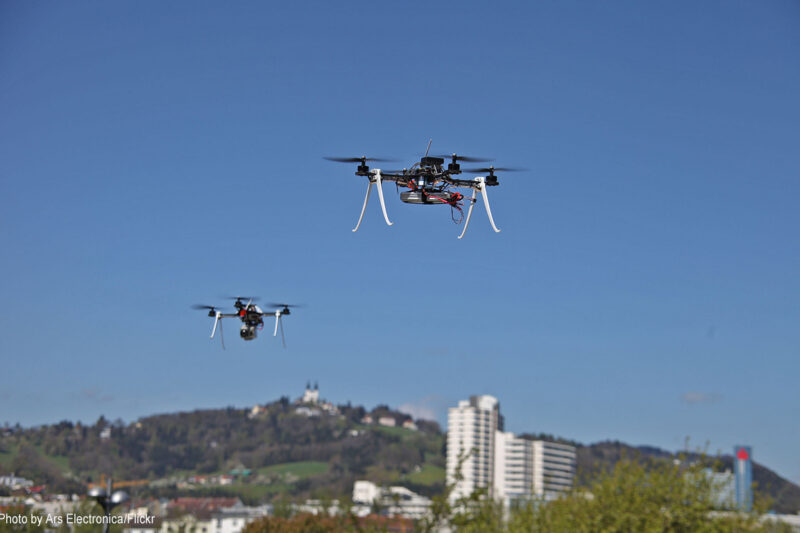
The arrival of domestic drones has set up a clash between two very powerful forces in American life. The result of that conflict will determine the role that the technology plays in our future.
Yesterday I wrote about how the future of domestic drones is precarious and uncertain because it will hinge on a number of unpredictable factors including safety concerns, security risks, nuisance factors, etiquette, and of course privacy. But another way of looking at the story is as a struggle between two powerful institutional forces.
One of those forces is business. The United States has always been a dynamic place, welcoming of innovation and enterprise and disruption. Pro-business forces are bolstered not only by a diffuse cultural admiration for entrepreneurship and risk, but also by very concrete institutional lobbying forces. The political power of business, which has throughout American history, is probably at an all-time high. I think itãs safe to say that compared to other advanced industrial nations, government agencies in the United States seeking to impose regulatory restraints on business face more political opposition than any other.
Already, pro-industry forces are huge job and productivity gains from the technology, warning that regulations to the United States in an international race to drone riches, and exerting significant political power on the FAA to hasten the ãintegration of drones into the national air space.ã
The second force is our security agencies. We are afflicted with a powerful and bloated national security establishmentãgiant bureaucracies that are fueled by threats, which they use to justify their ever expanding budgets and powers. We can expect our security establishment to trumpet the threat posed by drones, breathlessly any examples that may emerge, and push back against free and unregulated drone use. In July 2015 DHS an ãintelligence assessmentã to police departments around the United States warning of ãemerging adversary useã of drones. One reason why the future of the drone industry will (as I argued yesterday) depend on ãincidents and accidents,ã is the fact that any tragedies involving the technology will be seized upon by the security side in this struggle.
And although our bureaucratic security machinery is generally programmed to automatically see everything as a threat, and to seek to reduce that threat to zero, all other values be damned, that does not mean that the security threats from drones are not very real. How real remains to be seen.
But historically in the United States weãve tolerated a lot of risk when there are huge economic benefits to be grabbed. We have often ruthlessly swept away the obstacles to major new industries. The history of American railroads, for example, is a long story of not just relentless energy, innovation, competition and glorious visions of the future, but also one of corruption, power, exploitation, and a great many accidents and deaths and literal train wrecks taking place over the years, before the technology was improved to the point where it became more or less safe. As with railroads in the 19th century, a similar tale could be told of automobiles and road-building in the 20th, when entire neighborhoods were plowed apart to make way for highways, seemingly every waterfront in every city in America was striped with one, and to this day we tolerate an enormous amount of bloodshed and carnage on our roads.
When something is seen as ãthe futureã in this country, everybody better get out of the way because thereãs little that wonãt be swept aside in its name.
There are some areas where we Americans tolerate a lot of risk, and others where we tolerate virtually none. We pretty much have zero tolerance for airliner crashes. We have zero tolerance for terrorism. At the same time, we continue to tolerate tens of thousands of traffic deaths each year, and similar numbers of gun deaths. Whether drone tragedies break toward the ãgun/car accidentã category, or the ãterrorism/airline accidentã category, I canãt predict, but it will probably be the crucial determinant of the industryãs future.
Many technologies go through a phase of furious experimentation, innovation, and competition, in which a thousand flowersãand small companiesãbloom, before resolving into a stable industry dominated by a few large and powerful corporations. One possibility is that the outcome of the clash between entrepreneurialism and the security agencies will be that the ãchurning innovationã stage of drone development will be suppressed over security concerns, causing the industry to be dominated right from the start by a few major companies. Or, it may simply mean that regulations applied (or programmed in) to drones will significantly clip their wings and keep the market and utility of this technology relatively narrow.
As I have said before, given that a certain regulation of the airspace is justified and legitimate, those of us focused on civil liberties do not really have a dog in the fight between innovation and security, as long as security concerns are not used as a pretext to block drone-based photography, or to impose privacy-destroying blanket surveillance. But it will be most interesting to see how this clash plays out.


